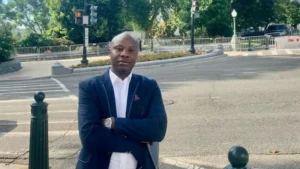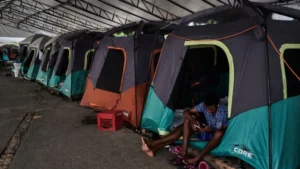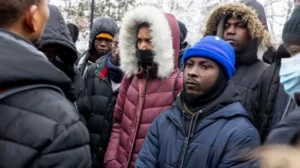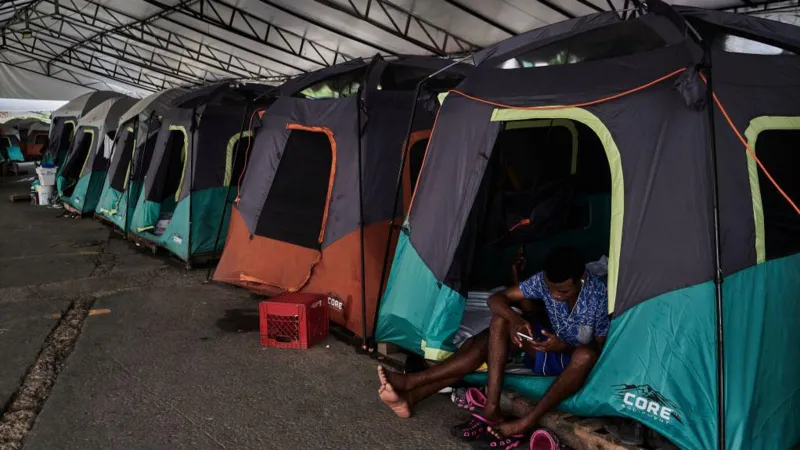For the growing number of African asylum seekers and economic migrants in the US, the upcoming presidential election could reshape their entire future.
“We deserve safety,” says Dr Yves Kaduli, a 38-year-old asylum seeker from the Democratic Republic of Congo who lives in the US.
“I have a dream that I will defend those that are persecuted,” he adds in a BBC interview.
Dr Kaduli says that in 2014, he fled eastern DR Congo – which has been wracked by conflict for almost three decades – after being kidnapped and tortured.

He had been working as a doctor at Cifunzi Hospital in Kalonge town and saw the effects of the conflict up-close.
“Women were raped. I saw it. I felt it in my body,” he tells the BBC.
Dr Kaduli says that horrified at the civilian casualties, he and many of his colleagues, including Nobel Peace Prize winner Dr Denis Mukwege, participated in protests against the killings and rapes by armed groups, criticising then-President Joseph Kabila’s government for its failure to guarantee the safety of people.
The medic says this led to him being targeted by unknown men.
Makeshift Camp

“They came, they took me and another colleague by force during our night shift,” Dr Kaduli recalls, adding that they were then taken to a makeshift camp in a nearby forest where they were beaten, tortured and threatened with death.
Dr Kaduli says that after being held for a day he managed to escape and decided he had to get out.
Leaving his mother and young son behind, Dr Kaduli says he began what would be a five-year journey, passing first through neighbouring Rwanda, then flying to Cuba, Ecuador, Nicaragua and finally arriving at the US-Mexico border in 2019.
“I remained on the border for at least a month, we were living in small tents in inhumane conditions.”
Dr Kaduli says he then succeeded in crossing into the US and was detained for 15 months, before being released.
He now lives in Virginia working as a medical technician, awaiting a decision on his asylum case.
Dr Kaduli is one of thousands of African migrants who against all odds complete the long journey to reach the US-Mexico border each year. It is a number that is rising.
But with many Americans saying immigration is a top concern in this election, and both candidates promising to crack down at the border, African asylum seekers are worried the public may turn against them.
“We see our politicians criminalise our status, demonise our community and being a president, they can decide our future,” Dr Kaduli tells the BBC.
In 2022, around 13,000 African migrants were recorded at the US-Mexico border, according to US Customs and Border protection data. By 2023, this figure had quadrupled to 58,000.
The UN High Commissioner for Refugees (UNHCR) reports a sharp increase in asylum applications from West African countries such as Senegal, Mauritania and Guinea since 2022 at the same border.
New Asylum Applications

New asylum applications from Senegalese nationals alone jumped from 773 in 2022, to 13,224 in 2024.
Although relatively stable, more than one third of the population in Senegal live in poverty, according to the World Bank.
A growing number of young Senegalese choose to migrate to the US rather than face the more dangerous route to Europe via the Mediterranean Sea.
They are opting for an increasingly popular route – which is being shared through social media, including TikTok – through visa-friendly Nicaragua.
In September 2023, more than 140 Senegalese people were deported back home after crossing the Mexico-US border.
People are coming to the US for mixed reasons, says Kathleen Bush-Joseph from the Migration Policy Institute, a non-partisan think-tank funded by research grants and foundations.
“People can be fleeing persecution and fleeing economic circumstances that make it difficult to feed their children. There are incentives to apply for asylum because they can get a work permit while they wait and that can really create a draw for people seeking to improve their lives,” she says.
Successfully claiming asylum in the US is particularly challenging for African migrants.
Language barriers, a lack of community upon arrival and a lack of awareness of African conflicts make the stringent process even harder for Africans, says Ms Bush-Joseph.
“Judges and attorneys are often not familiar with the situations in some of the African countries that people are fleeing,” she tells the BBC.
Risks for those Who are Deported
There are also risks for those who are deported.
In 2022, Human Rights Watch (HRW) released a report alleging that dozens of asylum seekers from Cameroon were imprisoned, tortured and raped after being sent back from the US border.
“People were deported directly back to harm and persecution and in contexts where there are ongoing conflicts and wide-spread human rights violations,” HRW researcher Lauren Seigbert tells the BBC.
“It’s just a huge risk to send people back,” she adds.
Federal Policy
Nils Kinuani, a federal policy manager at African Communities Together, an organisation that supports African asylum seekers and refugees in the US, says rhetoric around immigration in the election campaign has caused “great fear” among his community.
“People are fearful. There are concerns that refugee programmes could come under attack,” Mr Kinuani says.
His organisation and others are calling for more legal routes to help African migrants who are terrified of deportation.
One option is humanitarian parole status, a legal protection for foreign nationals from countries facing crises such as conflicts or natural disasters.
US Government to Allow People at Risk to Live and Work
It can be issued by the US government to allow people at risk to live and work in the US temporarily – current programmes include Ukraine, Cuba, Nicaragua, Haiti, Venezuela and Afghanistan.
There are no official humanitarian parole programmes in place between the US and any African country.
Mr Kinuani adds that there is some resentment over the way that refugees from Ukraine have been treated, compared to other nationalities.
Just a few weeks after the war broke out in Ukraine, nationals fleeing the conflict were eligible to apply for humanitarian parole, he says.
“Ukrainian communities didn’t even need to ask or advocate for humanitarian parole. For a country like Sudan, we have to push.”
US-Mexico Border Crisis
Since April 2023, the ongoing war in Sudan has forced nine million people from their homes.
Both the Democratic Party and the Republican Party have put controlling immigration and solving the US-Mexico border crisis high up on their list of campaign promises.
If elected, Republican candidate and former President Donald Trump would carry out “the largest deportation operation in American history” and reinstate border policies reminiscent of his first term in office, according to the official Republican National Committee’s 2024 Platform.
Meanwhile, the Democratic candidate and Vice-President Kamala Harris has promised to revive a bipartisan border security bill that failed in Congress earlier this year.
The bill would “increase asylum staffing” and ensure a “faster and fairer” asylum process, according to the White House.
But it has received criticism from human rights groups and the UN.
The outgoing administration of President Joe Biden – of which Harris is a part – has already moved to crack down on migrants at the border.
Executive Order
Under an executive order issued in June, officials can quickly remove migrants entering the US illegally without processing their asylum requests once a daily threshold is met and the border is “overwhelmed”.
This has led to a sharp decline in the number of people trying to enter the US through the border, according to US officials.
For the first time in almost two decades more than half of Americans want immigration levels to the US cut, rather than kept at their present level or increased, recent polling from global analytics and advisory firm Gallup suggests.
Increasing Awareness
“In the US there is an increasing awareness that the asylum system is so overwhelmed and people are making claims because there aren’t other ways to come to the United States,” says Ms Bush-Joseph.
“Frustration that people have about the dysfunction of the US immigration system does mean that there is concern about the number of people claiming asylum.”
For now, Dr Kaduli is stuck in limbo and could be left waiting four to 10 years for a decision on his asylum application.
He says that a couple of years ago, his father passed away, but his current status does not allow him to leave the country to see his family.
“I feel uncomfortable when my case is still pending and I see on the television the speech of politicians, but I know if I’m here it’s for a reason,” he says.
His ultimate hope is that one day his son and mother will join him in the US.
“I believe that America will give me the same values, to work for myself, to help my family, to participate in the economy of this country, so I’m between doubt and hope.”(BBC)



